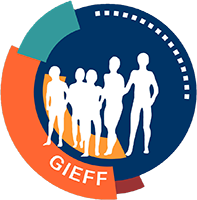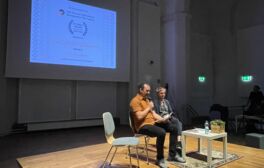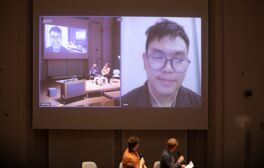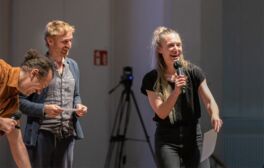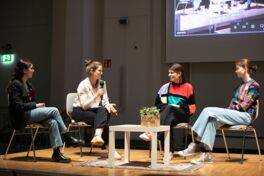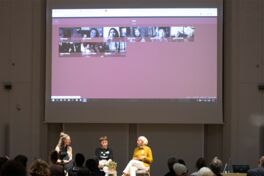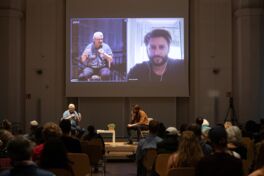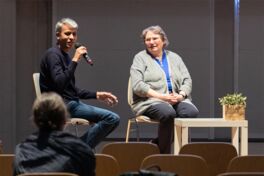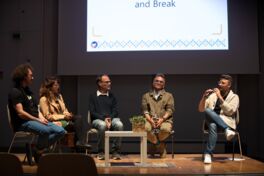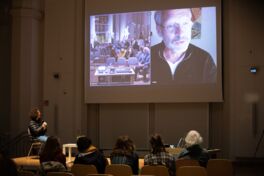Report on the 16th German International Ethnographic Film Festival
May 25th - May 29th, 2022
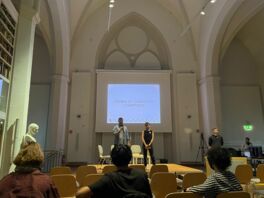
The festival is organised by an association, founded in May 2007.
The festival takes place in the heart of Göttingen.
The festival is founding member of CAFFE - Coordinating Anthropological Film Festivals in Europe.
The Festival Programme, was composed by an international selection committee, including former and new members. More than 400 media had been submitted. 74 films were selected, 24 for the student category, 5 for the main festival and 15 which were screened only online..
The festival began with the student competition, in which 24 films took part. The Student Award and the Manfred Krüger Award were decided by a three-member international jury.
Beside the presentation of new productions the festival had various main topics: "Living Conditions / Living Environment", "Living in Pandemic Times", "Family Relationships", "Women's Perspectives" "Coping with Transnational Borders/Bounderies", "On Labour", "Museum in Focus", "On Media", "On Media" and "Women's Perspectives".
There were also regional focal points such as: Focus Latin America and Africa in Focus
At the end of the festival a two days conference on Collaboration and Authorial Diversity in Film took place.
The Student Award Ceremony
More information about the ceremony and the films your can find here.
The decision regarding the Student Awards was made by international juries.
GIEFF Student Award Jury 2022
Mihai Leaha (Romania/Spain)
Simone Pfeiffer (Germany)
Michael Westrich (Germany)
Manfred Krüger Student Award Jury 2022
Caterina Alves Costa (Portugal)
Peter I. Crawford (Norway)
Dipesh Kharel (Nepal/Japan)
The winner of the GIEFF studend award, Abo Arangham, was not able to attend the festival neither on location nor online.
The winner of the two GIEFF honourable mentions attended the festival online (Sai Nyi Min Htut) respectively on location (Jenna Keiper).
The winner of the Manfred Krüger studend award, Jón Bjarki Magnússon, was present at the festival.
The winners of one Manfred Krüger honourable mention, Cledson Kanunxi, Jackson Xinunxi and Marta Tipuici, couldn't attended the festival. A colleague of them accepted the certificate..
The winners of one Manfred Krüger honourable mention, Sabrina Scherzer, Kathrin Schulz and Silja Pohland, attended the festival.
Discussing and Exchanging Ideas
Films from all Over the World
74 films from filmmakers of 35 different nationalities telling stories about people in 42 countries were presented.
Over 195 registered visitors from 21 countries followed the festival in Göttingen. They came from all over the world: Australia, Belgium, Brazil, Denmark, Cameroon, Canada, Czech Republic, Germany, Great Britain, Israel, Italy, Mali, Nepal, Norway, Poland, Portugal, Switzerland, Slovenia, the Netherlands, Turkey and the USA.
Half of the filmmakers were present during the entire festival, which meant that it was also possible to talk to them about their films later.
The World is Changing, so Are the Focal Points
Different value systems/orientations: The values of humanity have always changed. In today's world, characterised by processes of globalisation and migration, different value concepts meet each other on a daily basis.
The theme of values ran through almost half of the films. Several films dealt with religion in today's world. The thematic block "On Living Environment" dealt with value worlds in different contexts, and the thematic block "Coping with Transnational Borders/Bounderies" with transnational similarities and differences.
Environmental issues were touched upon in several films. The topic of water often played a role, the maintenance of traditional economic practices and environmental change were addressed in various films.
Living spaces were addressed in very different ways in the thematic blocks "Living Conditions", "Living in Pandemic Times", "On Labour", "On Living Environment" and "Coping with Transnational Borders/Boundaries".
Gender: During the festival, one block was specifically dedicated to "Women's Perspectives" and another to "Family Relationships". But gender roles played a significant role in several films.
Decolonisation For a long time, former colonies or ethnic groups have been dealing with the consequences of colonisation and in many ways have made demands for compensation and repatriation of goods, correction of representations or simply questions about guilt and responsibility. In the thematic block "On Museum", the topics of decolonisation and cultural heritage were reflected upon.
The festival has set itself the task of tracking down the latest trends in ethnographic film. This also results in focal points that were not so predictable, such as "On Labour", "On Media" and "On Music".
This time, the regional focus was on Latin America and Africa.
Hybrid Discussions
Two years ago, we were forced to go online with the whole festival. We learn somehow to organise group discussions online, which worked very well.
Therefore, we decided to conduct group discussions after each block in a hybrid form this time.
You can still follow the discussions online in the Programme per day: https://www.gieff.de/25-05-2022-2.html
Conference - Collaboration and Authorial Diversity in Film
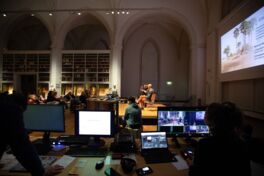
From Saturday afternoon onwards, a conference was held as part of the festival, dealing with different approaches to collborative working.
Here you can view the programme overview, the descriptions of the individual presentations and the report.
A new partnership: Ethnologisches Museum Berlin

GIEFF established a new partnership with the Ethnologisches Museum Berlin.
After the festival in Göttingen, a presentation of selected films took place at the Humboldt Forum in Berlin.
Travelling GIEFF
Since several years our festival films are travelling through out Germany and the world, very often they are shown at conferences or in seminars at the university, sometimes also at local cultural events.
If you are interested to organise a Travelling GIEFF please let us know: event@gieff.de
Furth information on Travelling GIEFF 2022.
